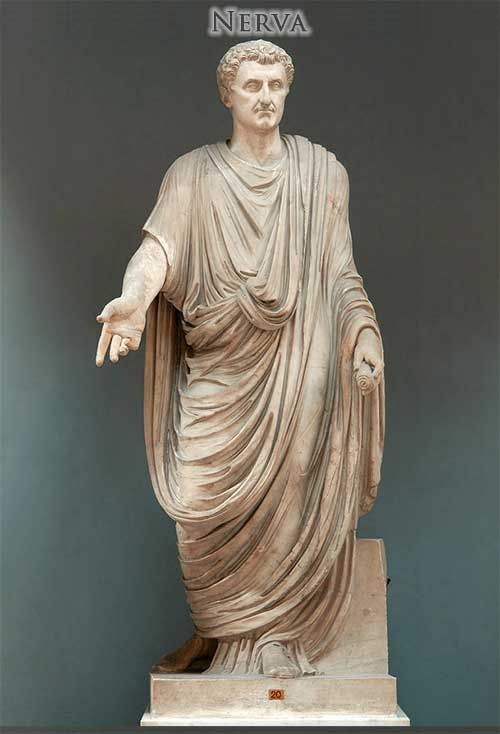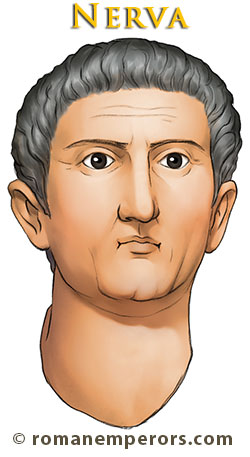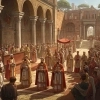Roman Emperor Nerva
96 - 98 A.D.
Marcus Cocceius Nerva Caesar Augustus
Busts, Statues, Coins, Information, Maps, Images, and More

Nerva: The Bridge Between Chaos and Stability – A Reign of Restoration and Reform
Marcus Cocceius Nerva, who reigned as Roman emperor from 96 to 98 AD, often finds himself overshadowed by his more illustrious successors, Trajan and Hadrian. However, his brief reign played a pivotal role in Roman history. He inherited a fractured empire following a period of civil war and ushered in an era of stability and restoration. Nerva's legacy lies not in grand conquests or ambitious building projects, but in his skillful leadership, pragmatic approach, and the groundwork he laid for the Roman Empire's golden age.
From Senator to Reluctant Emperor
Born around 30 AD into a prominent senatorial family, Nerva followed a traditional path, holding various prestigious positions throughout the empire. He maintained a low profile during the tumultuous reign of Domitian (81-96 AD), a period marked by paranoia and repression. Following Domitian's assassination in 96 AD, the Senate, fearing another power struggle, quickly declared Nerva emperor.
A Cautious Approach to Power Consolidation
Nerva, already in his sixties at the time of his ascension, was not the most physically imposing figure. Recognizing the importance of military support, he understood the need to appease the Praetorian Guard, the elite unit stationed in Rome. However, he was reluctant to resort to excessive donatives (financial rewards) – a common practice used by previous emperors to secure the loyalty of the troops.
The Peculiar Adoption of Trajan: A Calculated Move
Nerva's most significant decision was the adoption of Trajan, a popular and respected general stationed in Germania Superior (modern-day western Germany) as his heir in 97 AD. This move was a stroke of genius. By adopting a capable outsider with strong military backing, Nerva ensured a smooth succession and avoided potential power struggles within his own family. This adoption marked a significant break from tradition and established a principle that would be followed by future emperors – choosing the best successor regardless of blood ties.
Economic Reforms and a Focus on Stability
Nerva's reign focused on restoring stability and rebuilding the empire's finances. He implemented various fiscal reforms, including measures to crack down on corruption and increase tax revenue. He also addressed infrastructure concerns and oversaw the restoration of public buildings damaged during Domitian's reign. While not as flashy as the building projects of later emperors, these initiatives played a crucial role in laying the groundwork for future prosperity.
A Legacy of Restoration and the Dawn of a Golden Age
Nerva's reign was not without its challenges. He faced rebellions on the frontiers and a conspiracy from within the Praetorian Guard. However, he navigated these difficulties with pragmatism and caution, prioritizing the well-being of the empire over self-aggrandizement.
Nerva's greatest achievement may be his role as a bridge between the chaos of the Year of the Four Emperors and the golden age ushered in by Trajan. He restored stability, secured a peaceful succession, and laid the foundation for the empire's future growth.
A Ruler Overshadowed But Not Forgotten
Nerva's historical reputation has often been overshadowed by the more flamboyant reigns of Trajan and Hadrian. However, his importance cannot be understated. He assumed power at a critical juncture in Roman history and steered the empire away from the brink of further instability. His pragmatism, focus on reform, and wise choice of successor paved the way for a period of peace and prosperity.
Beyond the Historical Narrative: A Look at Nerva the Man
While historical accounts primarily focus on Nerva's political achievements, glimpses of his personality emerge. He was known for his wit, his appreciation for literature and philosophy, and his respect for the Senate. These qualities, coupled with his leadership skills, likely contributed to his success in navigating a challenging period.
Nerva's story offers valuable lessons in leadership. It highlights the importance of pragmatism, calculated decision-making, and the ability to prioritize the greater good over personal ambition. He may not have been a conqueror or a visionary builder, but his quiet competence and focus on restoration secured his place as a pivotal figure in Roman history.

More to Come

"Old Senator"
Marcus Cocceius Nerva became Emperor in 96 A.D. He was a 66 year old, well respected senator who had actually helped plan the assassination of Domitian. His family became prominent during the time of Augustus. The Senators of Rome declared Nerva Emperor after the assassination of Domitian. He was able to keep order in Rome but the Praetorian Guard and the Army sought for the death of the assassins. Nerva had them executed but the army remained bitter throughout his reign even though he sought to please them. His reign lasted not even a year and a half when he caught a fever and died in 98 A.D. The greatest act of the Emperor Nerva was in choosing a Spaniard named Trajan to succeed him. Nerva was technically the first of the "Five Good Emperors" but in contrast to Trajan he did not accomplish much.

















Latest




Popular




Useful




